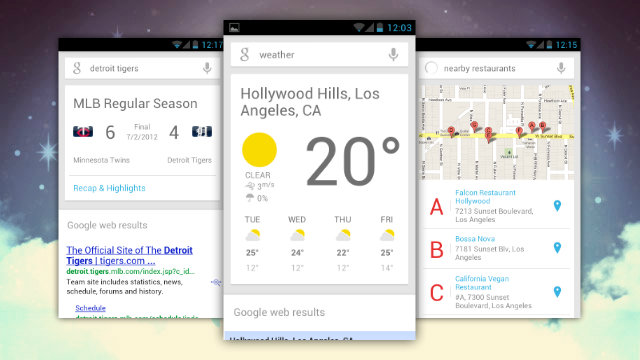 |
| Artificial Intelligence? Yaay!!! |
Everywhere you go you'll see Google doing something crazy with computing. It could be something like Artificial intelligence /w Neural networking or getting you information as you need like Google now or a Self-Driving Car too. Most of you Google fans see these technologies as cool, and they are, but if you look you'll there's a common pattern to their wacky & revolutionary inventions, which is to bring about the age of Web 4.0. Web 4.0 is basically the point when people and machines have a symbiotic relationship with each other. Coming together as one is another way to explain it. Computers on a network will assist people with everyday work.
What about Web 3.0?
If you're like me, you'd first think about Web 3.0 first, because I almost skipped the stage. While not enough people have openly used the term Web 3.0 in popular tech news, it's already alive and strong. So let's look at the characteristics of Web 3.0:- Website or Web Solution
- Which we already use for everything
- Mobile
- Like Android, Windows Phone, or iOS.
- Universal
- All over the world in as many mediums as possible.
- Accessible
- Available anywhere at any time. Similar to universal
- Individualized
- filtered and shared by friends or trusted source
- Efficient
- Contextual information accessible at anytime
 |
| This will be the biggest thing out there |
Full Scale
The truth is, Web 3.0 is soon to hit full scale within the next year for the US. It's to go even further in two years. There are actually signs listed below, all of which are from Google, that point to the fact that a full scale Web 3.0 is actually coming, and Google will dominate it:Android
 |
| Check out the market share |
This adds to the universal part of Web 3.0
Google Now
 |
| Screenshot of Google Now |
Internet everywhere
Google is making sure that internet will be going everywhere with their new projects Project Loon and mid-orbit satellites. This is surely an effort to get cheap, widespread yet effective service to places all over the world, then have them join Google's network. This will allow people in undeveloped nations to finally connect to the internet for the first time. With such connections, they have more advertisements worldwide, and people are able to produce more using data they never had access to, therefore both them and Google could increase overall revenue by a lot. They can also receive more data for contextual products like Google Now. With this the criteria of universal accessibility will be even further extended.The Moto X
 |
| This is the Moto X |
Android "K Release" A.K.A Key Lime Pie
This version of android is supposed to solve the problem of fragmentation, and allow for cheap, well-running devices to be some around the world using the android operating system. More people on the newest OS = More on Google Now. It's plain and simple. The accessibility instantly part of Web 3.0 instantly becomes greater. My previous blog post explains why I think I'll like the new Key Lime Pie. Instead of explaining that, I'll just point you to that post. |
| You're gonna love that key lime pie |
Other 3.0 Info
More Efficient API
If you look at the latest Google developer conference. You'll see that they were toting a lot about incredibly efficient Maps API for Android and new back end cloud systems for the average Android app so data can be transmittable and accessible everywhere with ease. They'll soon add predictive technology for the all Web Services and Android Applications. I have no proof on that last claim, but I can certainly bet you on it.
What Web 3.0 means for developers
Because Web 3.0 will be here full-fledged in a guesstimated 9 to 15 months, It means you developers will have no lives by the end of the year. You'll be stuck at your computer upgrading your product to stay current and ahead of the game for consumer's enjoyment. Fear not, by next Google I/O Google might have a solution for you to do it with ease almost like Android's Easy Cloud Function. On a serious note. Developers will probably start paying attention to automation inside of their apps. Many applications will utilize live information based on contextual information. Things like location based changes, phone distance from face, or maybe a wink from the person in front of the front facing camera. Really any contextually aware services that people can imagine will be more frequent in the coming year alone. And developers will play a key role in making sure that happens. Looking at the bright side, Android fragmentation might be reduced with the next Android release "K release". |
| Credit to Dayne Reast |
Where Photo Technology Fits In
Last Google I/O, Google was talking a lot about using camera technology with Google+. I bet you didn't know that Google also has an amazing photo search technology. Hopefully with the use of 3.0 technologies, photo quality and the use of those photos for everyday search will be twice as amazing as it is now.Now About 4.0
You're probably thinking, "That's Amazing! Now what about the original topic, Web 4.0?" So Web 4.0 is explained earlier as a platform where people and computers pretty much become one with each other. While so far there's not a clear definition of web 4.0 there's at least a small criteria to it, which are:- Artifical intelligence (computers with synthetic intelligence to resemble humans)
- Ambient intelligence (better described in a list)
- embedded: many networked devices are integrated into the environment
- context aware: these devices can recognize you and your situational context
- personalized: they can be tailored to your needs
- adaptive: they can change in response to you
- anticipatory: they can anticipate your desires without conscious mediation.
Do they seem familiar, because they should? Google has been easing this concept to people slowly but surely using Google Now and their Google [x] projects on artificial intelligence and more.
Here's a little about Google[x]
From Marques Brownlee
Wearable Computers
 |
| Next Gen Wearable Technology |
will be okay with having such technology integrated into their everyday lives, just as we have for every commercial technology until now.
The self-driving car
The self-driving car is the transition from Web 3.0 to web 4.0. It's predicted to hit mass audiences in 2016 once it's been tested and tried in multiple legislation. I'm betting the companies Kia and Hyundai will be the original testers for the service. They seem more eager to use Google's services. This type of car will probably be contextually aware. There's no telling what else will be part of this car, well just have to wait and see.
The Way We Game
Web 4.0 is going to change the way we game. A key example is the game Ingress. It's a contextually aware game that uses GPS sensors to play. I can only imagine the new ways Google will introduce their technology to further extend the very interactive gaming experience.
Conclusion
So that seems like pretty much everything. As I have said, Google seems to be heading toward the path of Web 4.0. Inside the tech world things change rapidly, and so will the definition of Web 4.0. What do you think Web 4.0 will be about, and how do you think modern technologist will bring it about to the world. I want to know your options about that.
Feel free to leave questions, comments or suggestions. Oh, and I'm looking to find a new name for my weekly post. A name that's fitting for all of the tech world, and something that's says trend setting as well. I want you the community to make some suggestions.
Feel free to leave questions, comments or suggestions. Oh, and I'm looking to find a new name for my weekly post. A name that's fitting for all of the tech world, and something that's says trend setting as well. I want you the community to make some suggestions.
No comments:
Post a Comment